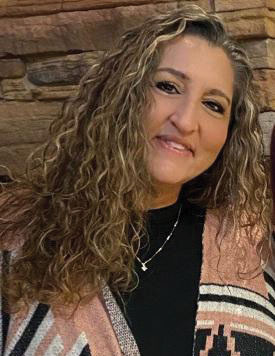Cristi Heath is 2022 Champion for Native Children
By Shelia Kirven
April 1, 2022
Cristi Heath, Yukon, Oklahoma, has been selected by the National Indian Child Welfare Association as a 2022 Champion for Native Children.
A member of the Choctaw Nation, Heath has worked for the Department of Human Services (DHS) for over 17 years and has spent most of her career with DHS in Oklahoma county.
She received her associate degree from Rose State College with honors and was a part of the Sociological Honor Society. She received her bachelor’s degree from the Univ. of Central Okla. (UCO) in Edmond, Okla., graduating magna cum laude.
Heath said, “When I started with the Department of Human Services, I did investigations (Child Protective Services) for four and a half years. Then I was part of the pilot program that they started in Oklahoma County called Kinship Foster Care. I worked doing that for a year and then supervised Kinship Foster Care in Oklahoma County from 2006-2009.”
She went on to reading home studies for people who wanted to be foster parents.
“I did what they called Family Centered Services for five years, supervised that for five years. And then I came to STPU (Specialized Placement and Partnership Unit) and have been doing that for the last two years,” said Heath.
On a day-to-day basis, Heath oversees the DHS youth in shelters across the state of Oklahoma. She supervises four liaisons who are each assigned a region of Oklahoma with 21 shelters that have placement of DHS youth. The liaisons check the shelters, assess safety, and see how the kids are doing.
She is also on the multi-disciplinary teams for the regions (five in Oklahoma) and sits on the team that staffs the youth in the shelters to see what/how they are doing and if there is any possible way to get the kids out of the shelter. One of the liaisons she supervises works with developmental disability applications, ensuring that all youth have an application for services that need it.
“I was a single mother for a long time and went back to get my education and was an older adult when I graduated. I felt like I had the life experience and the empathy and compassion and understanding of how it could be stressful to be a parent, but we all love our children and want the best for our children. I do believe that helped me be a more knowledgeable CPS worker.
“I did Kinship Foster Care because Kinship and ICWA (Indian Child Welfare Act) have always been in the forefront keeping families together, which is part of the reason why I went from foster care to prevention, the family-centered services.”
When asked what she would say to readers who either want to be a foster or adoptive parent or want to go into the field of child protective services, Heath said, “I would want them to know how very important it is that we keep kids connected to our kin, culture, to their kin, their culture and their community, and how important it is for children that are involved in the system to still have that feeling of belonging, what a difference it makes in their resiliency and their success. Someone who is getting involved, I would say to hope. Hope is what keeps me going and keeps me advocating for these youth, that they will have a better and brighter future no matter what their circumstances. I just feel like they can succeed so much better when they have that connection.”
Being Choctaw herself, she is always advocating for the children. Knowing the background of the historical trauma that Native American children experience, Heath recently took her team to Oklahoma City’s First American Museum to explain historical trauma and her own experiences to them. She said she tried to show them the correlation of the youth in the shelters and how important it is to keep them connected because of the historical trauma that goes along with where we came from.
Heath went on to explain her motivation for the trip.
“I did that so they would get a better understanding of how to assist and how very important it is to work with Native children and make sure they see their grandma and grandpa, that they have visits, and making sure that they have connections, even if they can’t have placement, they need to stay connected,” said Heath.


